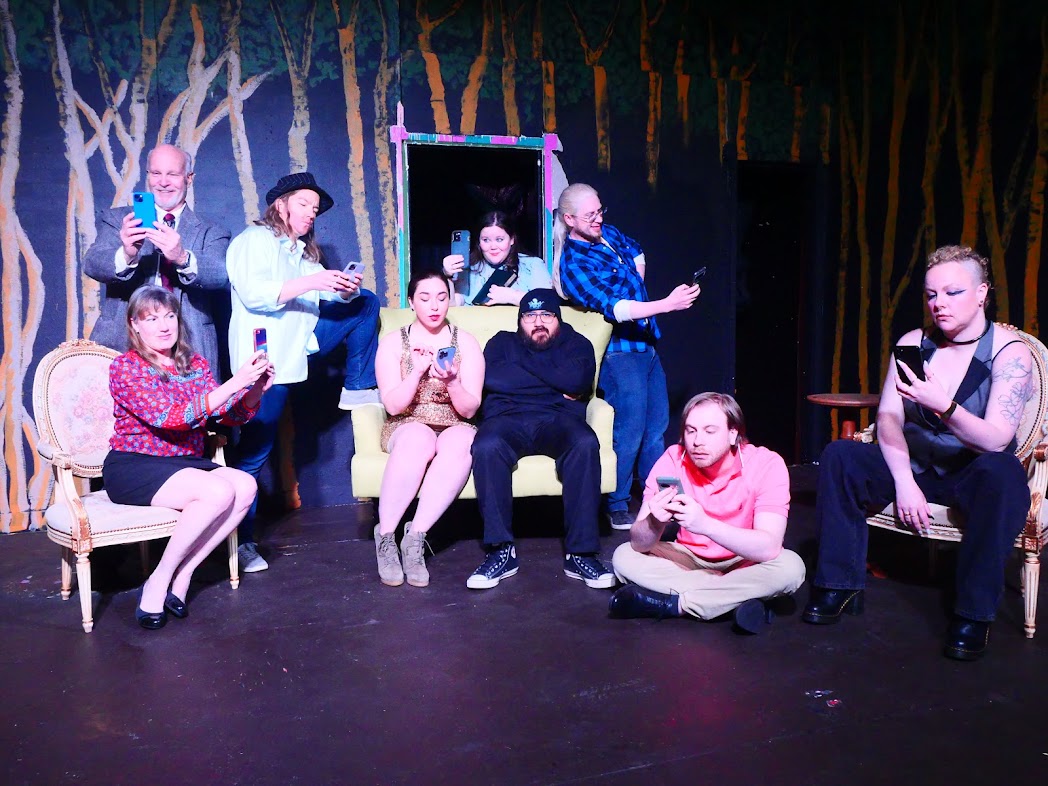
Powdered wigs are out; influencers are in. That’s the conceit behind director Brett Landis’ contemporary take on Molière’s The Misanthrope at Theater Company of Lafayette (TCL). Motivated by her increased use of social media during the pandemic, Landis realized the play could serve as a comedic commentary on the carefully controlled interactions of the digital age.
“That was how people were connected in a time when we couldn’t be face-to-face,” Landis says. “I started thinking, ‘How do we maintain real human connections when we are constantly having all these filters between us?’”
Landis, who first encountered Molière as an undergraduate at Carleton College, is a longtime admirer of the timeless playwright. Drawing from her early academic inspirations, Landis sees Molière’s exploration of social pretenses as ripe for adaptation in an era when online posturing often overshadows genuine self-expression.
“I was struck by how relevant and universal the themes were at the time,” she explains. “In college, I directed a production of Tartuffe about politics and religious hypocrisy in the early 2000s, so it had already crossed my mind once to update Molière in a contemporary setting. The Misanthrope is his play that most directly addresses the social facades that we create; social media seemed like a good fit for the false personas we put on for other people online.”
Software update
The 17th-century satire centers on Alceste, a man who despises the superficiality of society and yearns for a life where honesty prevails. But his love for the charming and flirtatious Célimène complicates his ideals, as she thrives within the very societal norms he detests.
In TCL’s adaptation, Célimène is reimagined as a successful social media influencer, while Alceste is a hater whose distaste for the online world offends his friends. The play weaves a complex web of relationships, jealousy and deception, all set against a backdrop that replaces Paris’ royal courts with an equally perilous online terrain.
“It was remarkable how little in Richard Wilbur’s translation felt out of place,” Landis says. “We are not changing the words, but we are using technology to suggest that the king is a Kardashian. One character is gender-swapped … Alceste reads a poem that we have replaced with The Cure’s ‘Not At All,’ and we set a poem by another character to folk-rock music to update the feel but not the language. But, aside from that, we’ve tried to keep the integrity of the text.”
In keeping with this knack for scrambling timelines, the production design cleverly merges historical aesthetics with 21st-century flair. But scenic designer Frank Landis — the director’s Francophile father who studied French in high school — wasn’t big on the idea at first.
“When I told him I was setting it in the present day, his face fell a little bit,” Landis says. “But he had the clever idea to bring elements of French Rococo design into a more contemporary look.”
Under the influencers
When it comes to giving these historical characters a modern twist, costume designer Hannah Richards looked for inspiration in celebrities like actress Zooey Deschanel and YouTuber Francesca Farago. Richards also created projections of social media posts and character selfies that will appear on the walls of the theater.
To further immerse the audience in the world of The Misanthrope, intermission includes a selfie contest and a TikTok challenge. Thanks to this and other points of engagement, actor Miranda Vargas believes the play will appeal to audiences of all ages.
“It will resonate with boomers, who have seen social media come into people’s lives, so will see a lot of the farce,” Vargas says. “I also think it would be good and confronting for young generations who are glued to their phones to see there are consequences.”
Landis hopes the production will encourage audiences to think about their relationship with technology. Her goal is not to demonize digital interactions but to promote a more mindful approach to our lives — online and off.
“I just want people to think about their media usage more consciously and intentionally,” Landis says. “The message is not that social media is bad or that we should all throw away our phones. It’s about being more thoughtful and looking at social media with a critical eye. You never want to lose sight of our ability to form authentic connections with other people, whether that’s over social media or face-to-face, because human beings need other human beings.”
ON STAGE: The Misanthrope. April 19-May 5, Theater Company of Lafayette, 300 E. Simpson
